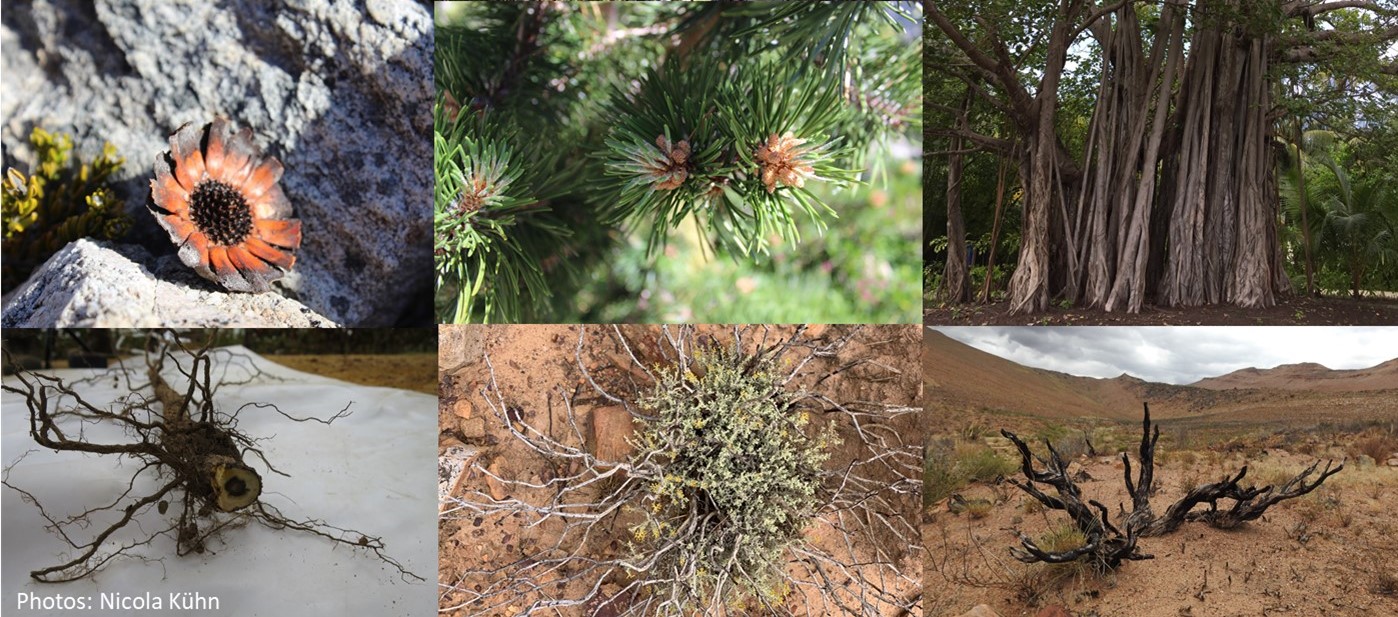Blog
Globally important plant functional traits for coping with climate change

By Nicola Kühn
“Look closely at nature. Every species is a masterpiece, exquisitely adapted to the particular environment in which it has survived.” E.O.Wilson From the early Greek philosophical musings of Empedocles and Aristotle in the 4th and 5th century B.C., through the naturalist accounts of Darwin and Wallace more than 14 centuries later, right up to the present-day wealth of ecological studies fighting for their place in a scientific journal, plant and animal adaptations to their environments have continued to fascinate us. We are however, at a point in history where the knowledge of these characteristics or traits that allow organisms to persist ... Continue reading
The value of systematic evidence synthesis for land use decision-making and practice
By Dr Gillian Petrokofsky
Systematic evidence syntheses were adopted in environmental management and conservation in 2006 “to promote and deliver evidence syntheses on issues of greatest concern to environmental policy and practice as a public service.” Since then, the tools developed within the environment community for assembling and analysing the evidence base of relevance to these great public concerns have slowly filtered out to other related disciplines. The Oxford Long-term Ecology lab has long supported the systematic mapping and reviewing of evidence for questions central to the interests of the lab group and pioneered an interactive systematic evidence map tool that ... Continue reading
Do flying cows have to pay a carbon offset?
By Professor Katherine J. Willis
Last week I learnt an interesting fact relating to carbon offsets when flying – if you fly business class you need to pay x 2.5 more carbon offset because of the additional space that you take up. This made me start to wonder, therefore, about the new international trade deals that the UK are signing with Australia and New Zealand. Whilst these are being heralded as new and exciting times for enhancing our international markets, not least the importation of New Zealand and Australia beef and lamb, we hear surprisingly little about the associated carbon footprint. Admittedly the meat from ... Continue reading
Ancient Plants, New Approaches
By Anna Lee-Jones
Encased within the unique Ryhnie Chert fossil system are some of the best-preserved early land plants in the world. Using pioneering digital technologies, we were able to reveal the developmental secrets of a transitional rooting organ which has laid hidden for over 400MYA. Understanding the evolutionary origins of roots is of fundamental importance, and this collaborative project showcased how applying innovative computational approaches to paleobotany can shed light on the deep past. [caption id="attachment_4621" align="alignleft" width="457"] Cladogram of lycophytes with rooting system characteristics labelled. Asteroxylon mackiei holds a key position for interpreting rooting system ... Continue reading
The Spanish Conquest & the Forests of Guatemala.
By Dr. William J. Harvey
Following the Spanish conquest of the territory that is now modern Guatemala (1524–1541 CE), the anthropogenic use of land use was radically transformed to support livestock husbandry, agriculture, large-scale timber extraction, mining, and new settlements. These changes are frequently documented in historical accounts and official records; however, these are scant and are often incomplete. In the absence of chronicled accounts or direct measures of land-use change, palaeoenvironmental data can be used to interpret the human impact following the Spanish Conquest. In our recent publication: “A palynological perspective on the impacts of European contact: Historic deforestation, ranching and agriculture surrounding the Cuchumatanes Highlands, Guatemala” we explore the ... Continue reading
Net biodiversity gain: gain for whom?
By Professor Katherine J. Willis
Over the past decade there has been a radical shift in the way governments, corporations, NGOs and landowners are starting to think and talk about the natural environment in the UK. This has been evident in an increased understanding not just of the critical role nature plays in providing landscapes for biodiversity (including rare and iconic species, communities, and habitats) but also of the ecosystem service flows from this nature which provide important societal benefits. The most obvious one, and the one with a clear and well-established market, is carbon offsetting and the role of trees, peats, wetlands, and soils ... Continue reading
A new acoustic system for detecting and identifying malaria-carrying mosquitos
By Dr. Marianne Sinka
There are around 3500 mosquito species in the world but only around 40 of them are capable of transmitting malaria to any significant degree. As few as seven species are responsible for the death of nearly 750 children under the age of five every day in sub Saharan Africa. Non-targeted use of broad-spectrum insecticides has resulted in wide-spread insecticide resistance amongst these primary vectors. However, targeted control require mosquito surveys which are expensive to run and require time, expertise and equipment which can limit their use by the vector control programmes that most need them. In a new paper published this ... Continue reading
Launch of the latest phase of the Local Ecological Footprinting Tool (LEFT) – 7th October 2016 – 5.00 – 6.30pm – Oxford Martin School
By Alistair Yeomans
We will be launching the Local Ecological Footprinting Tool (LEFT) on Friday 7th October in Oxford. This is the latest development phase of our web-based decision support tool for assessing risk in environmental management – https://www.left.ox.ac.uk/ (see brief details below) – previous iterations of which have already delivered critical benefits in business applications and academic research over the last four years. Many of the people who have already used the Tool during its pre-launch free access period will be attending as well as land management consultants and academics who have not yet tried it out. There will also be an opportunity of ... Continue reading
Latest on the Humbug project
By Dr. Marianne Sinka
Our database of mosquito recordings is growing with considerable help from the CDC in Atlanta, Dr Sheila Ogoma at USAMRU-Kenya, Alex Fyfe at the Jenner institute amongst others; it now contains several thousand recordings including free flying, non-tethered recordings of more than 20 species (multi-aged, both male and female). The updated database of dominant vector species sibling species in Asia is now completed barring a few final checks (and has already been used in a submitted paper). Work continues in trying to establish a colony of two UK species (Culiseta annulata and Culex pipiens) Watch these short videos of Culiseta annulata ... Continue reading
Money well spent? – Conservation in Europe
By Henrik Hannemann
Preservation of biodiversity within Europe is widely acknowledged as an important goal not only for the intrinsic value of biodiversity but also the important assets it provides in ecosystem services and associated human well-being. Key to counterbalancing loss of biodiverse land due to continued infrastructure development and land-use change a level of investment in conservation protection and research is critical. Currently c. 100,000 protected areas across Europe cover c. 6.2 million km2. My research has examined public expenditure on protected areas and biodiversity conservation within the 18 countrie... Continue reading
Meeting the President of Madagascar

By Dr Herizo Andrianandrasana
Meeting my President at Chatham House in London was a day to remember for me! I am a Merton College final year DPhil candidate working with Professor Kathy Willis in the Zoology Department of the University of Oxford and the last two years in the UK have been eventful to say the least. I am deeply committed to the conservation of biodiversity in my country and I have worked for some 15 years as Coordinator of Ecological Monitoring and Protected Areas in the Durrell Wildlife Conservation Trust’s Madagascar programme. My leadership in innovative conservation field-work was first acknowledged when I won the ... Continue reading
What are we rewilding for?

By Dr Elizabeth S. Jeffers
By Elizabeth Jeffers One of the primary objectives of rewilding* projects is the restoration of important ecological processes that have been lost due to the past extirpation of key members of the floral or faunal community. A main argument for species restoration within the rewilding paradigm is that humans are the main reason why these species were lost in the first place, and so we have a moral obligation to put them back. Other arguments focus on the expected ecological benefits of species restoration (typically large bodied herbivores), which include increased plant and invertebrate diversity, and nutrient cycling (e.g. bison ... Continue reading
Making Science Training Fun – Insights from the Lacrosse Pitch

By Dr Elizabeth S. Jeffers
Stiff competition for research funding has created a highly stressful environment for early career researchers trying to persist in academic science. We have to produce more papers, presentations, and grant applications than ever before. I don’t expect that the pressure will diffuse at any point in the near future, so how might research group leaders help their trainees to navigate this critical, but fraught, time in their career? Sports leaders have a number of useful strategies for motivating players to push their personal boundaries in order to achieve more than they might believe to be possible. Many of these strategies ... Continue reading
